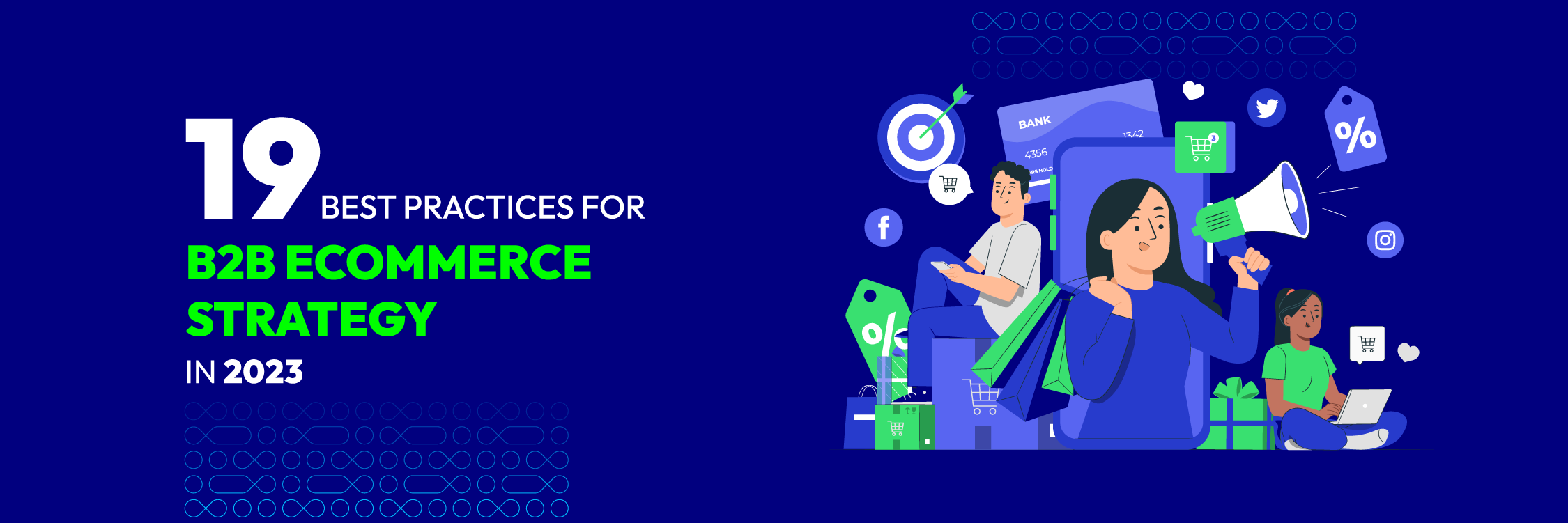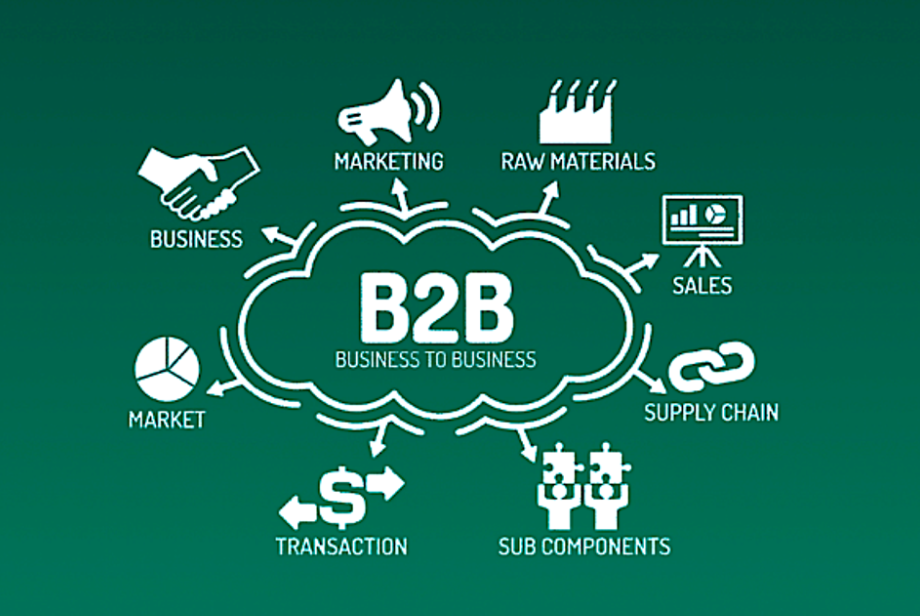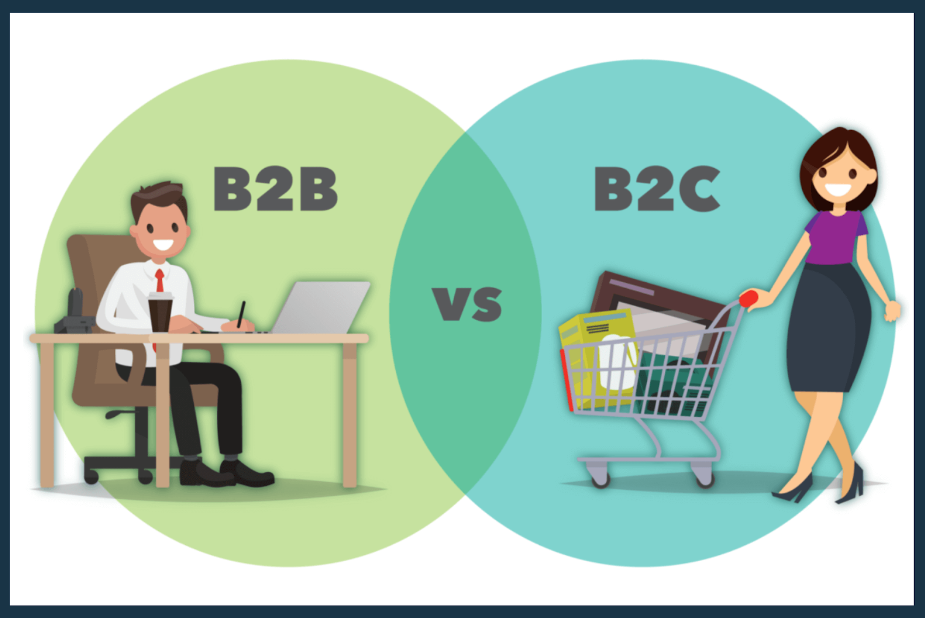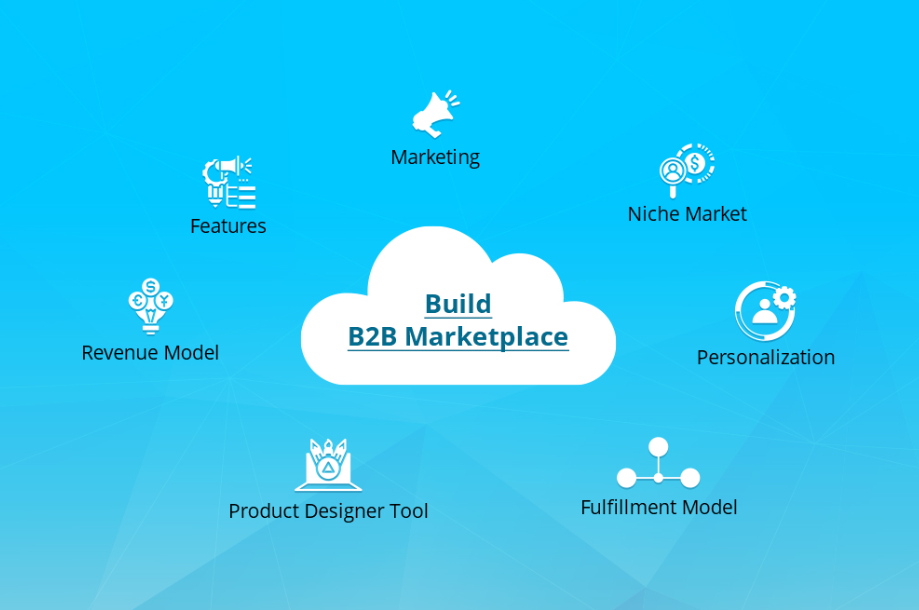19 Best Practices for B2B eCommerce strategy in 2024
Summer Nguyen | 09-30-2023


The Most Popular Extension Builder for Magento 2
With a big catalog of 224+ extensions for your online store
In the fast-paced realm of B2B eCommerce strategy, 2024 brings forth a new set of challenges and opportunities for businesses seeking growth and innovation. As digital transformation continues to reshape the way transactions occur, having a robust ecommerce strategy is no longer just an option; it’s a necessity. In this comprehensive guide, we delve into the 19 best practices that will empower B2B companies to craft a winning ecommerce strategy tailored to the demands of the year.
What is B2B eCommerce strategy?
B2B eCommerce refers to the online buying and selling of goods and services between businesses. In this model, the transactions occur digitally, where one business entity sells products or services directly to another business entity through an online platform or website. Unlike Business-to-Consumer (B2C) eCommerce, where businesses sell products and services directly to individual consumers, B2B eCommerce involves transactions between businesses themselves. It covers a wide range of industries and sectors, including manufacturing, distribution, wholesale, retail, and more. Read more: 12 Advantages of B2B eCommerce

A B2B eCommerce strategy is a comprehensive plan that outlines how a business will leverage online platforms to effectively sell its products or services to other businesses. It encompasses various tactics and approaches aimed at achieving specific business goals within the B2B context. A well-defined B2B eCommerce strategy takes into account factors like customer needs, market trends, technological advancements, and competitive landscape to create a roadmap for success.

Therefore, a B2B eCommerce strategy is a roadmap that guides a business in effectively using digital platforms to connect with other businesses, generate sales, and achieve its objectives. It takes into account various elements to create a seamless and customer-centric experience that aligns with the unique demands of the B2B landscape.
Related Post:
- Guide to Boost Sales with B2B Company Accounts Magento 2
- What is B2B PR? 5 Strategies to Promote B2B PR Campaign
The difference between B2B and B2C eCommerce strategy
B2B and B2C eCommerce strategies are distinct approaches to marketing and selling products or services, tailored to the specific needs and characteristics of their respective target audiences. Here are the key differences between B2B and B2C strategies:
| Aspect | B2B eCommerce strategy | B2C eCommerce strategy |
|---|---|---|
| Target audience | Businesses, decision-makers | Businesses, decision-makers |
| Sales Volume and Value | Higher order values, larger quantities | Smaller order values, quantities |
| Relationships | Long-term partnerships, trust | Brand loyalty, emotional connections |
| Purchase Decision Process | Multiple stakeholders, complex | Individual or family, impulsive |
| Content and Messaging | Technical, informative, practical | Emotional, aspirational |
| Personalization | Customized solutions, configurations | Tailored recommendations, offers |
| Channels | Direct sales, industry events | Stores, online marketplaces, social media |
| Transaction Process | Detailed negotiations, contracts | Quick purchases, no negotiations |
| Customer Support | Technical assistance, seamless ops | Quick responses, issue resolution |
Target Audience
B2B: B2B strategies target other businesses as customers. The primary audience includes procurement managers, business owners, and decision-makers within companies. B2C: B2C strategies target individual consumers who are purchasing products or services for personal use. The audience can be broad and diverse, encompassing various demographics.
Sales Volume and Value
B2B: B2B transactions often involve higher order values and larger quantities due to the nature of business operations and the need to fulfill organizational needs. B2C: B2C transactions typically involve smaller order values and quantities, as they cater to individual consumer needs.
Relationships
B2B: B2B strategies focus on building long-term relationships and partnerships. Trust, reliability, and effective communication are essential for fostering strong B2B relationships. B2C: B2C strategies emphasize brand loyalty and emotional connections with individual consumers. The relationship might be less personalized compared to B2B.

Purchase Decision Process
B2B: The B2B purchase decision often involves multiple stakeholders, including department heads, executives, and procurement teams. It’s a more complex and longer decision-making process. B2C: B2C purchases are usually made by individuals or families, and the decision-making process can be more impulsive or emotionally driven.
Content and Messaging
B2B: B2B content is typically more technical, informative, and focused on demonstrating the value of products or services for business operations. It addresses practical solutions and benefits. B2C: B2C content often aims to evoke emotions, desires, and aspirations. It focuses on the benefits of the product or service for personal use and enjoyment.
Personalization
B2B: Personalization in B2B strategies often involves customizing pricing, product configurations, and solutions to meet the specific needs of each business client. B2C: Personalization in B2C strategies includes tailoring recommendations, offers, and marketing messages based on individual consumer preferences and behaviors.
Channels
B2B: B2B strategies may involve direct sales, industry-specific events, trade shows, and targeted business networks. Digital channels include industry platforms and social media tailored to businesses. B2C: B2C strategies utilize various distribution channels, including physical stores, online marketplaces, social media, and influencer collaborations to reach a wide consumer audience.
Transaction Process
B2B: B2B transactions often require detailed negotiations, contracts, and agreements. The transaction process can be more complex and involve personalized terms. B2C: B2C transactions are generally simpler and quicker, involving a straightforward purchase process without extensive negotiations.
Customer Support
B2B: B2B customer support focuses on providing technical assistance, addressing business-specific challenges, and ensuring a seamless experience for ongoing business operations. B2C: B2C customer support aims to provide quick responses, handle inquiries, and resolve issues to enhance the overall consumer experience.
19 best B2B eCommerce strategies in 2024
CRO
The paramount B2B eCommerce strategy of 2024 revolves around Conversion Rate Optimization (CRO). This approach merges data-driven insights with personalized experiences, streamlining user journeys. It emphasizes trust-building elements like security badges and testimonials, while continuous testing refines layouts and CTAs. Mobile responsiveness and holistic funnel optimization cater to evolving B2B buyer behaviors. By integrating these facets, businesses can transform mere traffic into engaged, converted, and loyal customers, shaping a dynamic B2B landscape where conversions are not just achieved, but consistently enhanced.

Improve the user experience, boost sales, and ultimately grow your business.
Check it out!Email marketing
Email Marketing remains a cornerstone of successful B2B eCommerce strategies in 2024. Through targeted campaigns, businesses engage with B2B clients, nurturing relationships and driving conversions. Segmented lists enable tailored content delivery, while personalized subject lines and content increase open and click-through rates. Automation streamlines workflows, from welcoming new prospects to nurturing leads. Analyzing metrics provides insights for continuous optimization. With its cost-effectiveness and proven ROI, email marketing remains a powerful tool to foster engagement, communicate value, and drive B2B success in the digital age.
Influencer Marketing
influencer marketing emerges as a potent strategy. Collaborating with industry influencers allows B2B businesses to tap into established networks and credibility. These influencers can lend their expertise to endorse products or services, effectively reaching a targeted audience. By aligning with the right influencers, B2B companies enhance brand visibility, trust, and authority. From thought leadership to impactful content, influencer marketing fosters authentic connections, amplifying reach and engagement. In the era of digital relationships, harnessing the influence of key industry figures proves invaluable for driving B2B success.
Video Content
As attention spans shrink, B2B businesses leverage videos to convey complex concepts and solutions concisely. Explainer videos showcase product functionalities, while customer testimonials build trust. Webinars and virtual events offer interactive learning opportunities, positioning brands as industry thought leaders. With the rise of visual platforms, Video Content enhances engagement across websites, social media, and emails. The human touch of video fosters connections, aiding B2B buyers in making informed decisions. In a world where content is king, video reigns supreme, shaping the future of B2B communication and engagement.
Social Commerce
Social commerce emerges as a game-changing trend in B2B eCommerce strategy for 2024. B2B businesses are leveraging social media platforms as direct sales channels. By seamlessly integrating product showcases and shopping features, social commerce enhances the buyer’s journey. B2B buyers can explore products, access information, and even make purchases within their preferred social networks. This approach fosters convenience, while user-generated content and influencer partnerships amplify brand credibility. With the power of social engagement and immediate transactional capabilities, social commerce transforms B2B interactions, making them more accessible, interactive, and conversion-driven than ever before.
ERP
Enterprise Resources Planning (ERP) software plays a pivotal role in the robust B2B eCommerce strategy of 2024. It acts as the backbone, seamlessly integrating various business processes, from inventory management to order fulfillment. ERP systems provide real-time visibility into product availability, streamlining operations and enhancing customer experience. B2B businesses leverage ERP to synchronize data, ensuring accurate product information, pricing, and availability across different sales channels. With automation capabilities, ERP optimizes workflows, expediting processes and reducing errors. In the dynamic landscape of B2B eCommerce, ERP empowers businesses to deliver efficient, responsive, and seamless transactions, fostering growth and customer satisfaction.
Fast Load Times
Fast load times are a non-negotiable element of a successful strategy. With user attention spans shrinking, businesses prioritize optimizing their websites for swift loading across devices. Speed not only enhances user experience but also positively impacts search engine rankings, boosting online visibility. Slow-loading pages can lead to high bounce rates and lost conversions. By prioritizing fast load times, B2B companies ensure seamless interactions, reduce friction in the buyer’s journey, and create a strong foundation for engagement and conversion, ultimately contributing to their overall success in the digital landscape.
Privacy
With increasing data breaches and heightened awareness, businesses prioritize safeguarding sensitive information. Adhering to stringent data protection regulations, B2B companies implement robust security measures to protect customer and business data. Transparent privacy policies instill trust among buyers, while secure payment gateways reassure clients during transactions. From secure user authentication to encrypted communication, privacy efforts bolster credibility and customer loyalty. As privacy concerns continue to shape online interactions, B2B eCommerce strategies prioritize data security to create a safe and trustworthy environment for buyers in the digital space.
Marketplaces
Marketplaces have become a key facet of the B2B eCommerce landscape in 2024. B2B businesses are increasingly leveraging industry-specific and general marketplaces to expand their reach and tap into diverse buyer networks. These platforms offer a ready-made audience and simplified setup, enabling businesses to showcase products, connect with potential buyers, and drive sales. Marketplaces provide a competitive edge by capitalizing on their established reputation and customer base. B2B companies can diversify their sales channels, access new markets, and build brand visibility through strategic marketplace partnerships, making them a crucial element of a comprehensive B2B eCommerce strategy.

Virtual Reality
Virtual Reality (VR) is emerging as a cutting-edge component in the B2B eCommerce strategy of 2024. B2B businesses are utilizing VR technology to provide immersive product experiences and interactive demonstrations. Through virtual showrooms and product simulations, B2B buyers can explore complex products and solutions in a realistic environment. This not only enhances understanding but also expedites decision-making. VR facilitates remote collaboration, enabling buyers and sellers to interact seamlessly regardless of location. By leveraging VR, B2B companies create novel engagement opportunities, foster deeper connections with clients, and showcase their offerings in ways that go beyond traditional methods, revolutionizing the B2B buying experience.
Personalization
B2B businesses are harnessing advanced data analytics and AI-driven insights to deliver tailored experiences to individual buyers. From customized product recommendations to personalized email campaigns, personalization enhances engagement and conversion rates. By understanding B2B buyers’ preferences, behaviors, and pain points, businesses can address their specific needs effectively. Personalized pricing, content, and interactions foster stronger connections and trust. In the era of digital interactions, personalization is a powerful tool to stand out, build loyalty, and drive success in the competitive B2B landscape.
Self-Service
Self-service functionalities are a pivotal aspect of progressive B2B eCommerce strategy in 2024. B2B buyers increasingly seek autonomy and efficiency in their purchasing journeys. Self-service portals allow clients to access real-time product information, pricing, and inventory levels. B2B businesses empower buyers to place orders, track shipments, and manage accounts independently. This not only enhances customer satisfaction but also streamlines operations, reducing the burden on customer support teams. With the ability to access information and complete transactions at their convenience, B2B buyers enjoy a seamless experience that aligns with modern expectations, making self-service capabilities a driving force in B2B eCommerce success.
Referral Economy
The Referral Economy has become a significant driving force in B2B eCommerce strategy for 2024. B2B businesses recognize the power of leveraging their existing customers and partners to generate new leads and sales. By implementing referral programs, businesses incentivize satisfied clients to refer their peers, expanding the network of potential buyers. These programs foster organic growth, tapping into word-of-mouth marketing within professional circles. B2B companies offer rewards, discounts, or exclusive access to encourage referrals, creating a win-win scenario. In a landscape where trust and relationships are paramount, the Referral Economy empowers businesses to harness the influence of their satisfied customers to drive sustainable growth.
Expanded Payment Options
B2B businesses recognize the need to provide flexibility in how buyers can pay for their orders. Alongside traditional methods like credit cards and invoicing, businesses are integrating digital payment solutions, such as digital wallets and electronic fund transfers. These diverse options cater to varying buyer preferences and streamline the checkout process. Additionally, businesses are embracing innovative models like subscription-based pricing and installment plans to accommodate different budgeting needs. By offering expanded payment options, B2B companies enhance the convenience and accessibility of their platforms, leading to increased conversions and customer satisfaction.
Speedy Fulfillment
Speedy fulfillment is a central focus in the B2B eCommerce strategy of 2024. B2B businesses understand the importance of delivering orders promptly to meet the demands of fast-paced markets. Automated order processing, efficient inventory management, and real-time tracking ensure that products reach B2B buyers quickly and reliably. Businesses invest in streamlined logistics and partnerships with reliable shipping carriers to expedite deliveries. Speedy fulfillment not only enhances customer satisfaction but also strengthens relationships by demonstrating reliability and professionalism. In a landscape where time is of the essence, B2B companies prioritize swift order processing and delivery to meet the evolving expectations of their clients.
Security and Fraud Prevention
Security and fraud prevention stand as paramount concerns in the B2B eCommerce strategies of 2024. B2B businesses prioritize safeguarding sensitive information and ensuring secure transactions. Advanced encryption, secure payment gateways, and two-factor authentication are employed to protect customer data and financial details. Fraud detection systems are implemented to identify and prevent unauthorized activities. Businesses adhere to industry compliance standards and regulations, building trust with clients. By demonstrating a commitment to security, B2B companies foster confidence in their online platforms, assuring buyers that their information is protected, transactions are secure, and their business interactions remain confidential.

Protect your store from cyber threats with Mageplaza's top-notch security services
Check it out!Omnichannel
B2B businesses recognize that buyers engage with their brand across multiple touchpoints. Seamless integration across online platforms, marketplaces, social media, and physical stores ensures a consistent and cohesive experience. B2B buyers can initiate transactions on one channel and complete them on another, allowing for flexibility and convenience. Inventory synchronization and order management across channels enhance efficiency and reduce errors. In a digital landscape where fluidity is key, businesses prioritize omnichannel strategies to meet B2B buyers wherever they are, fostering engagement, conversions, and long-term relationships.
Mobile Commerce
Moblie commerce often referred to as m-commerce, takes center stage in the B2B eCommerce strategy of 2024. B2B businesses recognize the growing reliance on mobile devices for business interactions. Responsive design and mobile-optimized platforms ensure that B2B buyers can seamlessly navigate and transact on smartphones and tablets. Mobile apps provide a tailored experience, allowing buyers to access product information, place orders, and track shipments on the go. By prioritizing mobile commerce, B2B companies meet the evolving needs of modern buyers, enabling them to engage and transact whenever and wherever it’s convenient, enhancing user experience and driving conversions.
Speedy Fulfillment
Finally, Speedy fulfillment remains a focal point in the B2B eCommerce strategy of 2024. B2B businesses understand the urgency of meeting client demands promptly. Automation, efficient inventory management, and real-time tracking ensure orders are processed swiftly and accurately. By partnering with reliable logistics and shipping providers, B2B companies expedite deliveries, enhancing customer satisfaction. Speedy fulfillment not only showcases reliability but also fosters trust and loyalty among clients. As the business landscape accelerates, B2B enterprises prioritize rapid order processing and delivery to meet the evolving expectations of their partners and ensure efficient supply chain management.
Conclusion
In the ever-evolving realm of B2B eCommerce, navigating the landscape of 2024 demands a multifaceted approach that embraces innovation, customer-centricity, and adaptability. The 19 best practices presented here serve as a comprehensive guide for B2B businesses seeking to thrive in this dynamic digital environment. From harnessing the power of cutting-edge technologies like AI-driven personalization and virtual reality, to fostering authentic connections through influencer marketing and social commerce, these practices are designed to create a holistic B2B eCommerce strategy. Embracing the Referral Economy, prioritizing privacy, and optimizing for speed and convenience are essential pillars that shape the modern B2B buyer’s journey.



